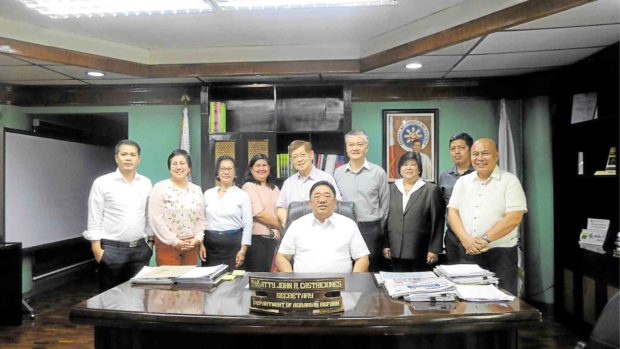
It has been a decade since property developer Jeffrey Ng was invited by his friend, the late Willie Uy, to join the board of the Subdivision and Housing Developers Association Inc. (SHDA). “Since then I have understood and realized the different problems, the pitfalls, the intricacies that the housing industry is facing,” shared Ng.
“As a developer, we’re here to make profits but it should be more than that,” said SHDA’s outgoing chairman. “It’s more than just making profit. It’s also doing our social obligation to society, of creating a legacy, wherein every Filipino can, hopefully in the next 10 years, finally get to own their own home. It’s about making an impact on the communities we’re in, in our society and in the country.”
Ng also attributes his drive to pay it forward to being a product of the University of the Philippines.
“As an economist and as an Iskolar ng Bayan, I think it’s time to give back to people who paid for my education in UP,” said the UP School of Economics graduate. It has thus become an advocacy of Ng to work with all the other private developers, government agencies, the Executive branch and Congress and rally all these groups to work together to make housing more affordable and available.

SHDA and Ng honor Sen. JV Ejercito (fourth from left) for being one of the principal authors of the law creating the Department of Human Settlements and Urban Development.
The past three years saw Ng getting involved more than ever in SHDA. He served as first vice president in 2017 before becoming president in 2018 and followed by being elected chairman this year.
“The past three years we have worked closely with the Senate committee on housing under Sen. JV Ejercito and the House committee on housing under (Rep.) Albee Benitez and after 30 years pending in Congress, they finally passed the bill to form the Department of Human Settlements and Urban Development,” Ng recalled.
He explained that unlike in the past wherein the Housing and Urban Development Coordinating Council (HUDCC) chairman merely coordinates with the different key shelter agencies, there will now have one leader in charge of implementing the housing program of the government, a Cabinet secretary who will be responsible to the President, to Congress and to the Filipino people in ensuring that the housing backlog is really going to be reduced.
According to Ng, this consolidation of the government’s housing units into one key agency benefits both developers and ordinary Filipinos. Developers can look forward to getting their HLURB housing permit approvals faster. “There is going to be better coordination among these key shelter agencies,” he added.
In turn, this will result in property developers building faster and more efficiently. “We can be more competitive and sell cheaper, better houses to the ordinary Filipino homebuyer,” Ng further disclosed.
SHDA, up to now, is working with Senate and Congress for the implementing rules and regulations so that it will finally be operational next year.
With HUDCC Sec. Eduardo Del Rosario after signing a MOA between the government agency and the association.
Another accomplishment that Ng is proud of as chairman of SHDA is how the organization was able to bring to the attention of Pres. Duterte and Agrarian Reform Secretary John Castriciones how the land conversion process sometimes takes up to two years.
The long and tedious process involves going through a myriad of government agencies.
“When the President heard about it, together with the DAR secretary, they had taken out the DA certification as a requirement for the land conversion process,” explained Ng. Land conversion process will soon take just a few months, unlike in the previous years.
With Ng at the helm, SHDA had also worked closely with the Foundation for Economic Freedom to free up more agricultural land for housing use, subdivision use, and other industrial uses. “We need to free up more land so that farmers can be able to mortgage or sell their free patents,” said Ng.
“With the help of FEF, Congress also passed the agricultural free patent reform law which would allow agricultural free patents to be transferable and mortgageable to other individuals, and even corporations,” he added. This means that there would be a slight increase in the supply of available land for mass housing in the country, especially around urban areas.
In economic terms, according to Ng, mass housing has the biggest multiplier effect on the country. It has an effect on so many other industries plus it impacts society as well.
SHDA brass pay a courtesy call on Sen. Francis Tolentino (seventh from left), Chairman of the Senate Committee on Housing.
“Once people get to own their own house, they become far more responsible citizens,” relates Ng. “They would have to work hard and become more productive citizens because they have to pay a monthly amortization of the house for the next 25 to 30 years.” This results in less non-productive citizens.
SHDA’s chairman thus encourages all property developers to get involved, as part of their respective companies’ corporate social responsibility and as their civic duty, and put in time to help the government lower the housing backlog. “Decrease the backlog to zero in the next 10 years. It’s impossible but that’s SHDA’s fighting goal,” he said.
Lofty goal aside, Ng said to cut the backlog by half—down to 3 million—would be a big success in itself: “I think even if we can dramatically reduce the backlog that would be a success already. The backlog has been increasing the past 20, 30 years. If we don't improve, the backlog will even increase to 10 to 12 million from 6.5 million. It will double unless we reverse that trend.”
He is confident that the organization’s next leaders, such as president Raphael Felix and first vice president Rosie Tsai, will be able to bring SHDA to greater heights and more success in ensuring that we work closely with government to bring down the backlog to zero in the next 10 years.
“I think I have put in my time in the past ten years so it’s time to move on. It's about time to let fresh people handle the situation, take over the leadership of SHDA,” he explained when asked why he did not put himself up for reelection. “I will stay on as an adviser to the board in the years to come, not as a fully active officer,” he concluded.
Ng stresses on the government and private sector’s need to address the housing backlog in the country which is now at 6.5 million houses. Multiply that number by four—assuming that each house consists of four family members—and you’re talking about almost 25 million Filipinos who still do not have a house to call their very own.
“This is really a pity because it’s a right of every Filipino to own his own home,” he shared. “And it’s a cause worth fighting for.”


